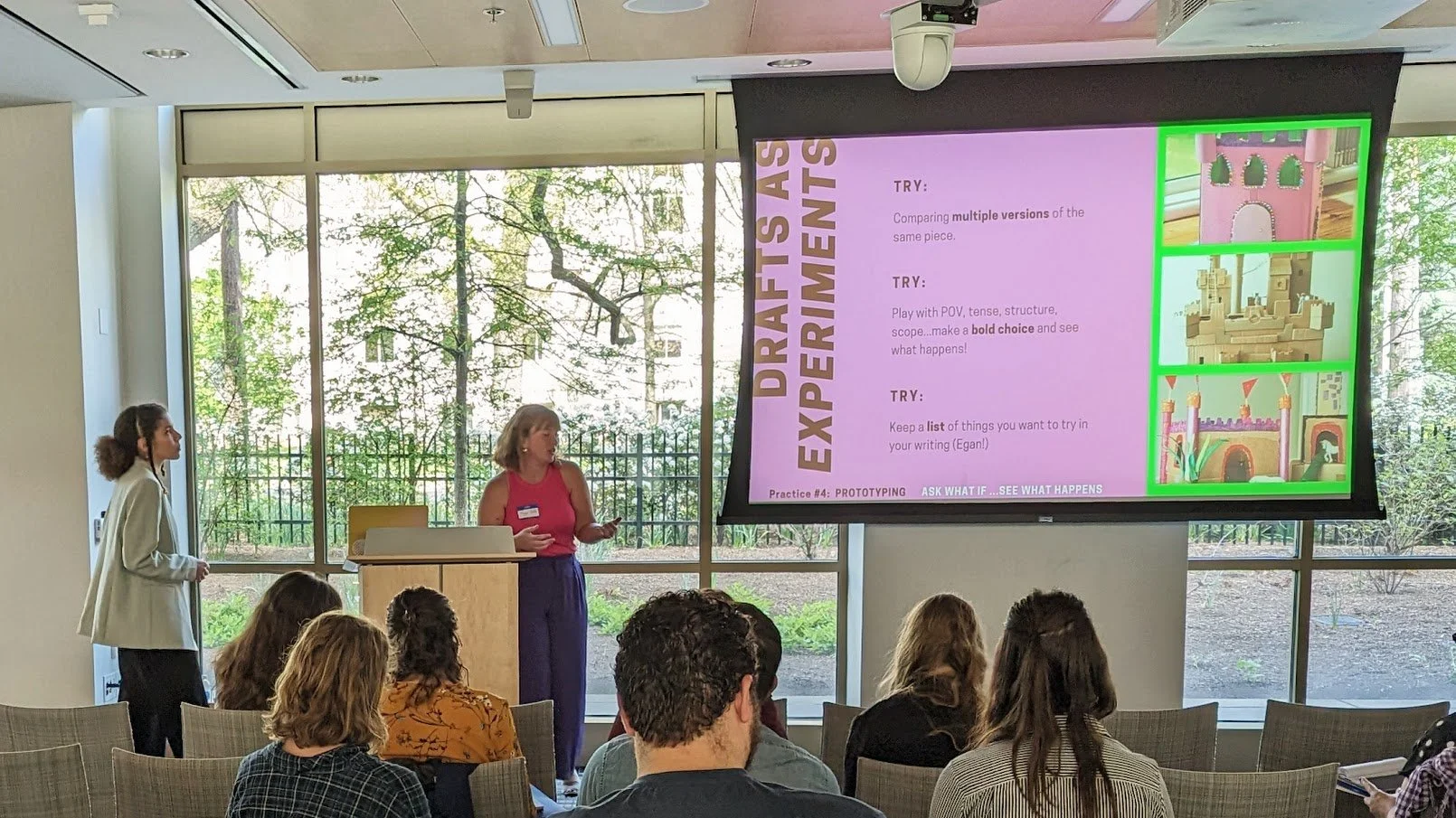Design Thinking: Barrelhousing with Conference Session Leaders Marguerite Sheffer and Corinne Cordasco
Marguerite Sheffer and Tierney Oberhammer at the April 2023 Washington, DC conference.
As writers, we’ve all been stuck. Whether it’s figuring out an ending to the 87,000 word novel you’ve been working on for two years, or what that sad alien spaceman story is really about, or just how the hell do I move this story about the old man sitting in his neighbor’s basement with a gun and a bottle of rum along, we have all been frustrated and not quite sure how to move ahead (yes and sorry, those are all literally things that the person typing this introduction is trying to figure out right now). Maybe we can apply a little design thinking to our work? At our Philadelphia conference on September 23, Marguerite Sheffer and Corinne Cordasco will lead a session about design thinking and how it can help writers move ahead in their work. This is a repeat performance for Marguerite, who led this workshop along with Tierney Oberhammer at our DC conference in April. That session received such rave reviews that we asked them to come to Philly as well. Here’s a quick interview about the session, design thinking, and how it just might be able to help me figure out how to get that sad spaceman back home.
1. Can you tell us a little bit about the session and how it will go?
This session is hands-on and fast-paced. We’ll share a teeny bit about what design thinking is and how it can help you combat the kind of perfectionism that makes you freeze up. Then, we’ll spend much more time trying out some DT-inspired writing practices that we’ve found revolutionary in our work to stay loose and fun and generative when we don’t know what to do next (which is often). We’ll actually try them out in the session so you’ll leave with 5 practices to add to your tool kit.
2. Okay I am a dummy: what is design thinking?
Design thinking is an approach to problem-solving that is heavy on process and refuses quick answers. It focuses on exploration, ideation, feedback, and iteration to really get to the core of a sticky challenge. For us as writers, we’ve found it helps us lean into the unique and unpredictable to help us create the work that only we can. DT helps shift a writer’s focus from the “ideal” piece to working through the very next step.
3. How did you get the idea for this session?
We’re in a writing group together (Wildcats, with Tierney Oberhammer!) and we’ve developed a shared vocabulary and approach that has kept writing really fun. Design thinking is inherently collaborative and messy, and that’s how our writing feels at its best, which is very different from the idea of a solitary genius sitting down and writing the great American novel in one draft. Also, we both have day jobs that involve design thinking--Maggie teaches design thinking for “social impact” (for people working on social issues like climate change and public care) but has found that some of these same approaches have crept into writing in wondrous ways. Corinne works in user experience, writing for websites and apps that often have a lot of constraints, requiring creative approaches. We recognized the parallels and it gave us a great shorthand to fall back on when writing got hard, and we wanted to share that more broadly.
4. What do you hope writers will take away from the session?
We want writers to value the messiest parts of their work, and to use that as fuel to keep going. We want writers to be comfortable with uncertainty and to stay playful as they draft and revise. For writers who are feeling isolated or lonely, we want to introduce some collaborative practices that can help them feel safe to take big risks in their work. We want writers to leave with new tools for their writing: concrete action steps they can reach for the way they would reach for a screwdriver or a hammer to solve particular problems. We hope that all of this combined will offer writers a way to get back into a piece they really care about when they’re feeling stuck.
5. Sorry but we ask this of everybody we've ever interviewed: What's your favorite Patrick Swayze movie?
Maggie: To Wong Foo, Thanks for Everything!
Corinne: Dirty Dancing (classic!), but Roadhouse is a close second!

